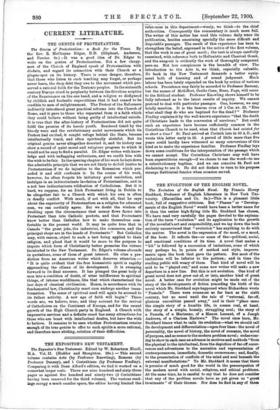THE EXPOSITOR'S NEW TESTAMENT.
The Expositor's New Testament. Edited by W. Robertson Nicoll, MA. Vol. II. (Hodder and Stoughton. 285.) — This second volume contains Acts (by Professor Knowling), Romans (by Professor Deaney), and 1 Corinthians (by Professor Findlay). Comparing it with Dean Alford's edition, we find it worked on a somewhat larger scale. There are nine hundred and sixty-three pages as against five hundred and ninety-two (2 Corinthians having been reserved for the third volume). The various read- ings occupy a much smaller space, the editor having limited the •
_
references in this department—wisely, we think—to the chief authorities. Consequently the commentary is much more full. The writer of this notice has used this volume daily since its publication, besides examining specially the more difficult and disputable passages. The result of this experience has been to strengthen the belief, expressed in the notice of the first volume, that the work is one of great merit ; the text is always carefully examined, with reference both to Hellenistic and Classical Greek, and the exegesis is evidently the work of thoroughly competent persons. Not less conspicuous is the breadth of view. The introduction to the Acts is, we think, especially valuable. No book in the New Testament demands a better equip- ment both of learning and of sound judgment Much labour has been lately expended on the book by critics of various schools. Precedence may fairly be accorded to Professor Ramsay, but the names of McGiffert, Orello Cone, Blass, Page, will occur to the Biblical student. Professor Knowling shows himself to be fully informed as to the latest results of inquiry. We cannot pretend to deal with particular passages. One, however, we may briefly mention. It is the famous crux of 1 Cor. xv. 29, "Else what shall they do who are baptized for the dead ? " Professor Findlay explains it by the well-known experience "that the death of Christians leads to the conversion of survivors." But could such an experience have become sufficiently common in the Corinthian Church to be used, when that Church had existed for so short a time ? St. Paul arrived at Corinth late in 50 A.D., and wrote this letter early in 56. A period of little more than five years could hardly have witnessed so many conversions of this kind as to make the experience familiar. Professor Findlay lays down some conditions for the interpretation of the passage which we cannot accept. The Corinthian Christians may well have been superstitious enough—if we choose to use the word—to use a substitutionary baptism. • And we can conceive St. Paul not disdaining to use it. He did not disdain to turn to his purpose strange Rabbinical fancies when occasion served.






































 Previous page
Previous page